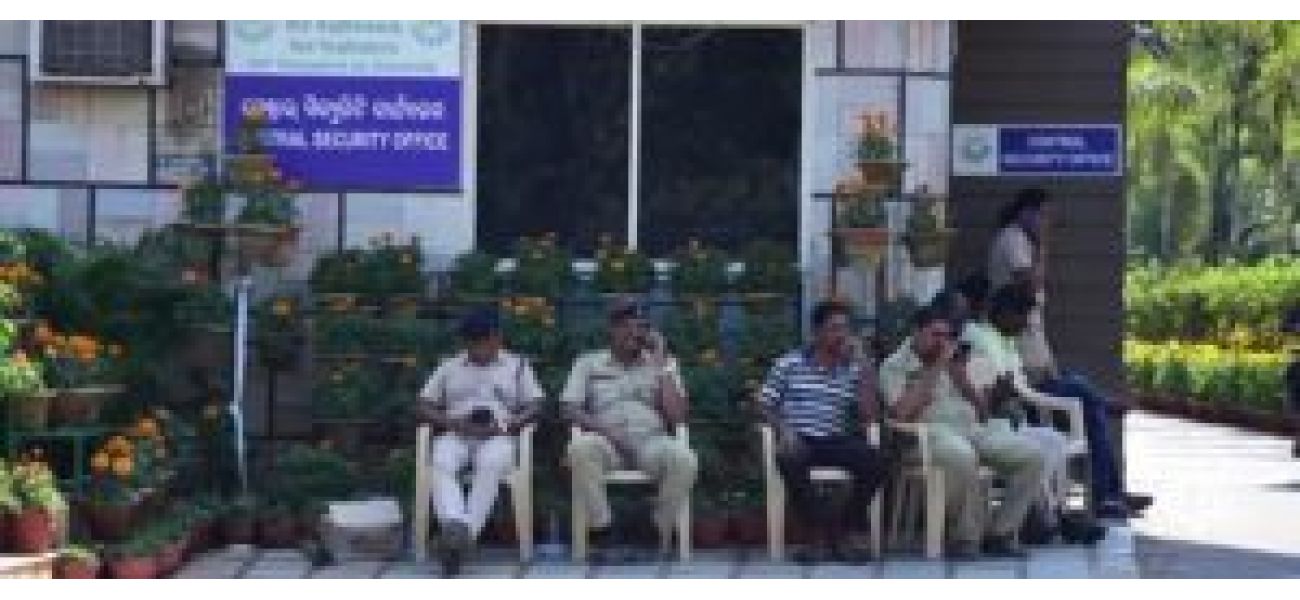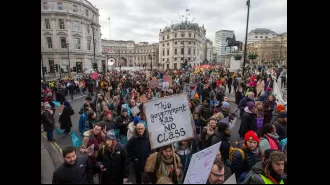Many students, activists, and lawyers are challenging police involvement.
Unrest at KIIT campus after student's alleged suicide and brutal treatment of protesting students by guards and bouncers.
February 20th 2025.

Bhubaneswar: The incident that took place at Kalinga Institute of Industrial Technology has caused quite a stir. It all started with the tragic news of a 20-year-old BTech student from Nepal taking her own life. As if that wasn't enough, things took a turn for the worse when hundreds of students demanding justice were forcefully evicted from their hostels. What's even more concerning is the inhumane treatment they received from the university guards and bouncers. The absence of the police during this chaos has raised a lot of questions about their role in this whole ordeal.
Last year, the police faced a lot of backlash for their mistreatment of citizens in the Bharatpur police station incident. And now, their alleged mishandling of the situation at KIIT has not only tarnished Odisha's reputation as the education hub of eastern India, but it has also put a strain on their relationship with Nepal. Furthermore, videos of the police instructing the evicted students to return to the campus have surfaced on social media, causing people to question their integrity. Lawyers and social activists are calling for an investigation into their actions.
The news of the student's suicide came to light on February 16 when her cousin brother filed a complaint at the Infocity police station. He alleged that she was constantly harassed by a fellow student, Advik Srivastav, who was later arrested due to public outcry. This incident sparked tensions on the campus, especially among the Nepalese students, who began protesting and demanding justice. However, instead of helping these overseas students, the authorities declared a sine die and forcefully evicted them from their hostels. They were then crammed into buses and dropped off at railway stations. Some students even claimed that a woman constable was involved in their eviction, along with the university's security personnel. It's disheartening to see that instead of bringing the culprit to justice, the police were more interested in siding with the powerful and suppressing the students' voices.
Activists and lawyers are questioning why the police were aiding the university authorities in committing violence against the students instead of controlling the situation. The convenor of Students Against Corruption, Bibhuti Bhusan Mohapatra, raised some valid points, "Who gave the police orders to evict and bring back the Nepalese students? Were they paid by the university or the government? And why were the Nepalese students beaten up after the student's body was found?" Another activist, Sann, also expressed their concerns, "The Odisha Police arrested five university staff members, but why were the two female officials who made racist remarks allowed to go free? This is only going to harm the relationship between India and Nepal."
The fact that the five university staff members arrested for their involvement in the violent assault on the students were granted bail by a local court has sparked discussions about the alleged police bias. Senior advocate Chittaranjan Dash believes that a thorough investigation should be conducted to determine if the police were also involved in the attack instead of protecting the students. He also accused the police of purposely charging the accused with "lighter" sections to ensure their quick release. "They should have charged them with attempted murder and kidnapping," he said. When asked about their handling of the situation, the IIC of Infocity police station, Mahendra Kumar Sahu, denied any involvement of the police in the assault. "We immediately arrested the culprit, Advik Srivastav. The incident at the hostel is not in our control and can be investigated," he said, avoiding a direct question about their mishandling of the entire situation.
Last year, the police faced a lot of backlash for their mistreatment of citizens in the Bharatpur police station incident. And now, their alleged mishandling of the situation at KIIT has not only tarnished Odisha's reputation as the education hub of eastern India, but it has also put a strain on their relationship with Nepal. Furthermore, videos of the police instructing the evicted students to return to the campus have surfaced on social media, causing people to question their integrity. Lawyers and social activists are calling for an investigation into their actions.
The news of the student's suicide came to light on February 16 when her cousin brother filed a complaint at the Infocity police station. He alleged that she was constantly harassed by a fellow student, Advik Srivastav, who was later arrested due to public outcry. This incident sparked tensions on the campus, especially among the Nepalese students, who began protesting and demanding justice. However, instead of helping these overseas students, the authorities declared a sine die and forcefully evicted them from their hostels. They were then crammed into buses and dropped off at railway stations. Some students even claimed that a woman constable was involved in their eviction, along with the university's security personnel. It's disheartening to see that instead of bringing the culprit to justice, the police were more interested in siding with the powerful and suppressing the students' voices.
Activists and lawyers are questioning why the police were aiding the university authorities in committing violence against the students instead of controlling the situation. The convenor of Students Against Corruption, Bibhuti Bhusan Mohapatra, raised some valid points, "Who gave the police orders to evict and bring back the Nepalese students? Were they paid by the university or the government? And why were the Nepalese students beaten up after the student's body was found?" Another activist, Sann, also expressed their concerns, "The Odisha Police arrested five university staff members, but why were the two female officials who made racist remarks allowed to go free? This is only going to harm the relationship between India and Nepal."
The fact that the five university staff members arrested for their involvement in the violent assault on the students were granted bail by a local court has sparked discussions about the alleged police bias. Senior advocate Chittaranjan Dash believes that a thorough investigation should be conducted to determine if the police were also involved in the attack instead of protecting the students. He also accused the police of purposely charging the accused with "lighter" sections to ensure their quick release. "They should have charged them with attempted murder and kidnapping," he said. When asked about their handling of the situation, the IIC of Infocity police station, Mahendra Kumar Sahu, denied any involvement of the police in the assault. "We immediately arrested the culprit, Advik Srivastav. The incident at the hostel is not in our control and can be investigated," he said, avoiding a direct question about their mishandling of the entire situation.
[This article has been trending online recently and has been generated with AI. Your feed is customized.]
[Generative AI is experimental.]
0
0
Submit Comment





